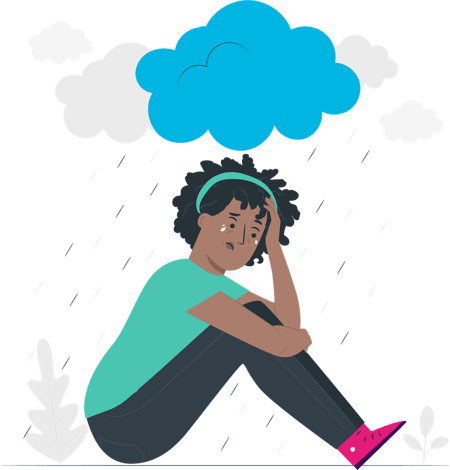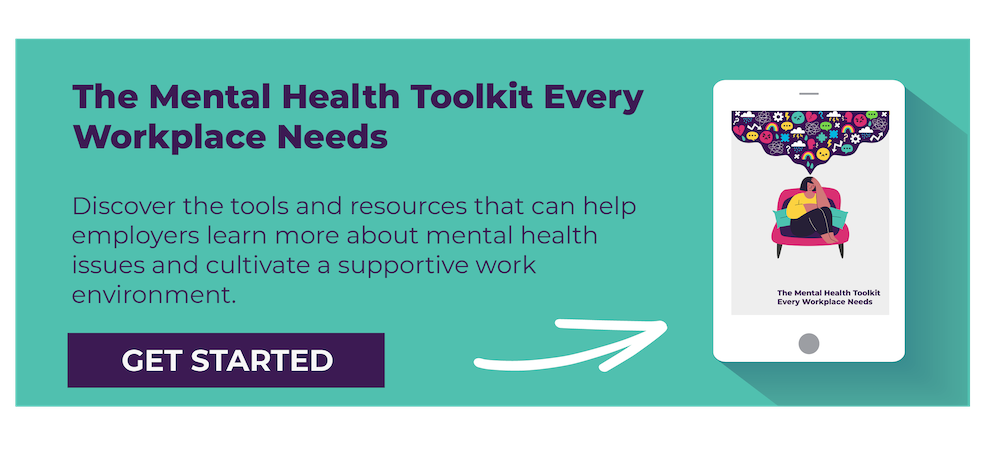 Do you know the signs and symptoms of depression?
Do you know the signs and symptoms of depression?
Depression is a costly condition for businesses and for the individuals who leave it unchecked. The American Psychiatric Association estimates depression causes $44 billion annually in lost productivity and about half of employees with depression are untreated.
Even before COVID hit, our country saw an increase in mental illness. Between 2017-2018, 19% of adults experienced a mental illness, which is an increase of 1.5 million people over last year, according to Mental Health America’s report, The State of Mental Health in American 2021.
On top of that, the number of individuals seeking help for anxiety and depression has gone through the roof. Since the previous year’s screening, there was a 62% increase over 2019’s depression screens.
October 7 is National Depression Screening Day. You would want your employees to get their cholesterol, heart, and blood pressure screened — why not their mental health?
Below, learn more about the signs and symptoms of depression, free resources for mental health, and how to connect with an employee in a depressive state.
What is Depression?
Depression, which is also called major depressive disorder, is a common and serious medical illness that can negatively affect how someone feels, thinks, and acts. Thankfully, it is a treatable condition despite the fact the person experiencing it may not always think so.
Depression is known for causing feelings of hopelessness, sadness, and a loss of interest in work and other life pleasures. Symptoms must be ongoing and last at least two weeks while also showing a change in a person’s function to be an official depression diagnosis.
Left untreated, it can cause significant emotional and physical problems that can make it challenging for a person to function at both home and work. Clinical depression can also lead to suicide if left unchecked.
On October 7, consider opening up the conversation about depression in the workplace. Make it easy by sharing this depression screening with employees. It’s free and confidential.
The Major Risk Factors for Depression
Depression is a serious mental health condition that can impact anyone. Across the globe, it impacts around 5% of adults but is also known as a leading cause of disability worldwide, according to the World Health Organization. It’s estimated that 280 million people around the world have depression.
Depression risk factors include:
- Genetics - Depression runs in families and can be passed down.
- Personality - Individuals with low-self esteem or who are more pessimistic are more likely to have depression.
- Biochemistry - The chemical makeup of a person’s brain can lead to depression. A faulty mood regulation combined with other factors can put a person at risk.
- Environmental factors - Consistent exposure to abuse, neglect, poverty, and violence can make individuals more vulnerable to depression.
- Adverse life events - For those who have experienced traumatic life events like a car accident, bereavement, etc., developing depression is not uncommon.
- Other life events - Divorce, having a baby, a new job, job loss, and retirement can all contribute to depression.
A person’s health can also play a large role in depression risk. Someone who has cardiovascular disease or diabetes, for example, can become depressed and vice versa.
Signs and Symptoms of Depression to Recognize
It’s important for employers to note the difference between grief, sadness, and depression. It’s normal to be sad and grieve when someone passes away. Grief and depression can cause individuals to withdraw from others and social activities, along with feeling sad. Depression is ongoing and lasts much longer than grief and doesn’t accompany feelings of self-loathing.
Signs and symptoms of depression to watch for include:
- Ongoing fatigue
- Restlessness, irritability
- Loss of interest in activities once enjoyed
- Persistent sad, anxious, or "empty" mood
- Sleeping too little, early-morning awakening, or sleeping too much
- Reduced appetite and/or weight loss, or increased appetite and weight gain
- Persistent physical symptoms such as headaches or chronic pain
- Difficulty concentrating or making decisions
- Talks of feeling guilty, hopeless, or worthless
- Recurring discussions of suicide or death
Other health conditions can also overlap with clinical depression. Knowing this, it’s important for employers to encourage annual check-ups and even host workplace biometric screenings to help employees better understand where their health markers stand.
How to Reach Out to a Depressed Employee
Suffering alone isn’t easy. Many depressed individuals will say they feel alone in their feelings and don’t feel supported. As an employer, if you recognize an employee suffering in silence, offering support can be a vital step in getting them the help they need.
Some tips to reach out to a struggling employee:
- Remember laws and HR - Don’t assume an employee has depression. Avoid telling them you think they have it, too. That’s for a clinical or licensed psychologist to decide. Remember, the Americans with Disabilities Act (ADA) is clear that harassment based on mental health isn’t allowed. While an employee can keep their depression quiet, you do have four options for asking medical questions pertaining to mental health, including if there’s evidence an employee isn’t able to do their job or poses a safety risk due to their mental health. Learn more on the Equal Employment Opportunity Commission website.
- Show empathy - If you notice they’re struggling with their workload or frequently absent, have a conversation about how they may need support. Be open and don’t judge; just listen.
- Offer confidential conversations - If you have a loyal, hard worker who is struggling and honest about their situation, ongoing dialogue may be helpful. Managers may consider creating time on their calendar for one-on-one confidential conversations to ask how the individual is holding up.
- Get HR involved - Don’t feel comfortable or safe broaching the topic? Speak privately with another supervisor on how to handle it. Or, get a human resources representative involved. Time is of the essence, so doing it as soon as you notice something amiss can make all the difference in treatment for the employee struggling.
Understand that an employee may come to you without warning to discuss their issue and potentially ask for accommodations. By understanding depression’s symptoms and how it may impact your employees, it will give you as a leader a better grasp on how it can impact their daily work functions. It will also help you anticipate and prepare for helping them adjust when they have a hard time.
Some accommodations may include taking medical leave, a more flexible work schedule, and time away from work to ward off burnout.
Resources to Help Facilitate Workplace Discussions
What mental health resources does your company have available? Whether you’re a large Fortune 500 company or a small business, it’s important to have a handful of useful resources to offer your team.
Allow your workers to have access to multiple resources so they can get help in the way they feel most comfortable. Sometimes an immediate supervisor isn’t someone an employee feels they can trust with such personal information. Have employee assistance opportunities and a library of resources that can be privately accessed.
If it’s tempting to put off getting these resources together, don’t. It can be the difference between someone feeling hopeful or helpless. And the resources at work may be the only option a person has access to in order to start making significant positive changes and learning coping skills.
To get started, here are helpful resources to get your content library together:
- Mental Health America
- Better Help
- Virtual Mental Health Summit (November 5-6, 2021)
- National Alliance on Mental Illness
For IMMEDIATE help for someone in crisis, use these resources:
- Emergency: 911
- National Domestic Violence Hotline: 1- 800-799-7233
- National Suicide Prevention Lifeline: 1-800-273-TALK (8255)
- National Hopeline Network: 1-800-SUICIDE (800-784-2433)
- Crisis Text Line: Text "DESERVE" TO 741-741
- Lifeline Crisis Chat (Online live messaging)
- Self-Harm Hotline: 1-800-DONT CUT (1-800-366-8288)
- Essential local and community services: 211 website
- National Council on Alcoholism & Drug Dependency Hope Line: 1-800-622-2255
- Veterans Crisis Line website
What resources does your workplace have that aren’t on this list? How do you start conversations about the risk factors for depression in your company? Share your thoughts below!



